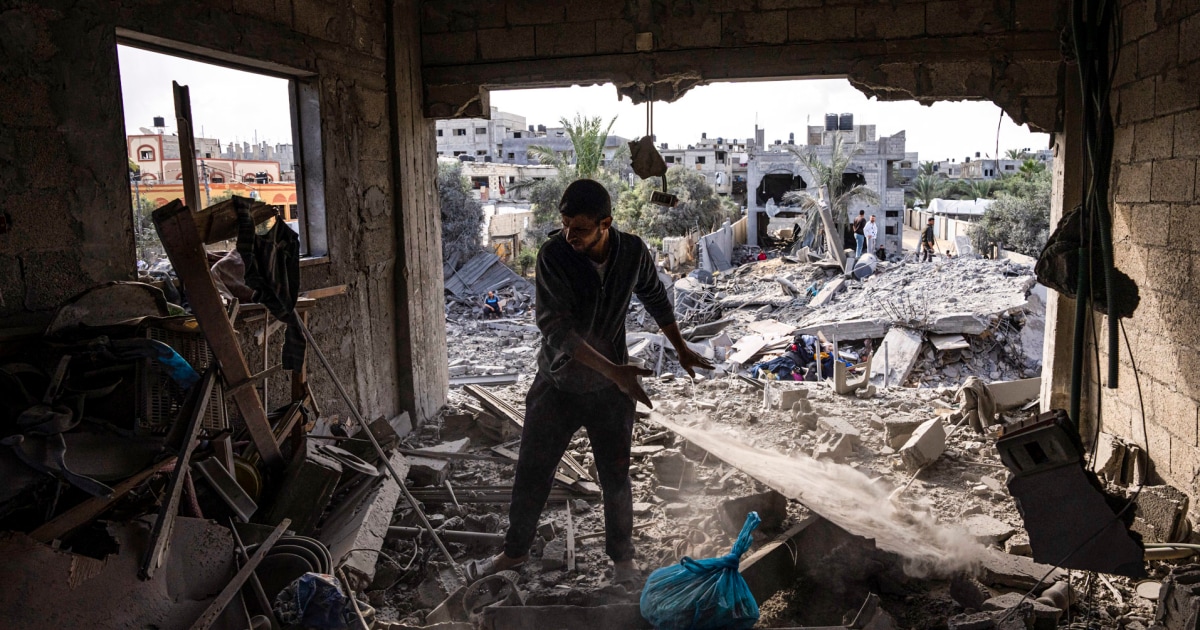A fragile ceasefire between Israeli forces and militants in the Gaza Strip appeared to be holding on Sunday after a five-day standoff that killed 33 Palestinians and two people in Israel.
The latest round of fighting in Gaza broke out on Tuesday when Israeli planes killed three senior commanders of the Islamic Jihad militant group in response to earlier rocket fire from Gaza. Those killings unleashed a barrage of militant fire and the conflagration threatened to drag the region into another all-out war until an Egyptian-brokered ceasefire went into effect late Saturday.
While the calm seemed to bring a sense of relief to the 2 million Gazans and hundreds of thousands of Israelis who had been largely confined to bomb shelters in recent days, the deal did nothing to address the underlying problems. that have fueled numerous rounds of clashes between Israel and Palestinian militant groups in the Gaza Strip over the years.
In Gaza, residents surveyed the latest damage done to their surroundings, with holes gouged in apartments that Israel said were hideouts for the six high-ranking Islamic Jihad members killed during this round. Gaza’s main cargo crossing with Israel reopened on Sunday after warnings that keeping it closed would force the closure of Gaza’s only power station, deepening the energy crisis.
Israel was gradually lifting restrictions on residents in southern Israel, who had been hit hardest by the rocket fire.
Israeli officials expressed satisfaction with the latest battle, as they killed at least six members of Islamic Jihad’s top brass in what they say were targeted strikes based on solid intelligence. But at least 13 of the dead in Gaza were civilians, including children as young as 4, as well as women.
Prime Minister Benjamin Netanyahu said targeted attacks on militant hideouts would reverberate throughout the region.
«Israel’s enemies in Gaza and far beyond Gaza know that even if they try to hide, we can and are prepared to reach them at any time,» he told a cabinet meeting.
Israel has faced criticism in the past from rights groups over civilian casualties in its bombing raids on Gaza. Israel says it does everything possible to avoid harming civilians in its attacks and says the militants operate from the densely populated areas of the territory to fire rockets indiscriminately at Israeli communities.
Even if some of the attacks were targeted, others destroyed the homes of uninvolved Palestinians.
“If they want to target a house, let them target it alone. Why destroy the entire neighborhood? Why?» said Mai Sarson, whose home in Deir el-Balah was reduced to ruins in an Israeli attack.
Throughout the fighting, Israel’s repeated airstrikes against Islamic Jihad and its command centers and rocket launch sites showed no sign of stopping the rocket fire, prompting Islamic Jihad to declare victory and sent Palestinians onto the streets on Saturday night.
The Israeli army reported more than 1,400 launches during the fighting, with some rockets reaching as far as the Tel Aviv and Jerusalem areas. Israeli planes hit more than 400 targets, according to a preliminary military tally, which also showed that around a fifth of the rockets missed and fell in Gaza, while most of the rest were intercepted or fell in open areas.
An 80-year-old woman and a Palestinian worker working inside Israel were killed by rocket fire. A Palestinian human rights group said three people, including two children, were killed in Gaza by errant rockets.
It was the latest in a long series of battles between Israel and Palestinian militants in Gaza since the Islamic militant group Hamas seized control of the coastal territory in 2007. Israel and Hamas have fought four wars and there have also been numerous minor flare-ups.
The more powerful Hamas has praised the Islamic Jihad attacks but stood by during the latest round of fighting, limiting the scope of the conflict. With the de facto government blamed for the dire conditions in the blockaded Gaza Strip, Hamas has recently tried to keep its conflict with Israel at bay. Islamic Jihad, on the other hand, a more ideological and rebellious militant group married to violence, has taken the lead in recent rounds of fighting with Israel.
Saturday’s agreement did not address many of the causes of the repeated fighting, including Israel’s ongoing blockade of Gaza, the large stockpiles of weapons held by Hamas and Islamic Jihad, and Israel’s policies in the occupied West Bank and east Jerusalem.
The violence in Gaza came after more than a year of fighting in the occupied West Bank, where the Israeli army has been staging arrests almost every night and Palestinians have carried out repeated attacks. Tensions could spike again this week when Israeli nationalists stage an annual march through a sensitive area of Jerusalem’s Old City that Palestinians view as a provocation.
Israel captured the West Bank, East Jerusalem and Gaza in the 1967 Middle East war. The Palestinians claim all three areas for a future state. Israel withdrew from Gaza in 2005, but Hamas subsequently invaded the territory, driving out forces loyal to the internationally recognized Palestinian Authority.
Israel and Egypt have maintained a blockade on Gaza in what Israel says is a policy aimed at preventing Hamas from arming itself. Palestinians and international rights groups say the policy, which restricts the movement of people and goods in and out of Gaza, amounts to collective punishment.

